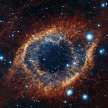Earth's closest planet is Venus. It is often referred to as Earth's sister planet due to its similar size, mass, and composition. Venus is the second planet from the sun and is located between Mercury and Earth with no moon and rings. It has a thick atmosphere composed mainly of carbon dioxide, with clouds of sulfuric acid. Venus is also known for its extreme temperatures, with surface temperatures reaching up to 864 degrees Fahrenheit (462 degrees Celsius), making it the hottest planet in our solar system.
Venus has a weak magnetic field, which is about 1% as strong as Earth's magnetic field. It has a very slow rotation, taking about 243 Earth days to complete one rotation on its axis. This means that a day on Venus is actually longer than a year on Venus, which takes about 225 Earth days to complete one orbit around the sun.
Venus has a unique atmospheric phenomenon known as "super-rotation," where the atmosphere rotates much faster than the planet itself. This causes winds to reach speeds of up to 220 miles per hour (360 kilometers per hour) at the planet's cloud tops, making it the fastest atmospheric rotation in the solar system. Venus has a retrograde rotation, which means it rotates in the opposite direction to most other planets in our solar system.
Venus has a rocky, terrestrial surface that is similar in size and composition to Earth. However, its surface is much hotter and more hostile than Earth's due to its thick atmosphere and extreme greenhouse effect. The surface of Venus is covered in volcanic plains, mountains, and impact craters. The planet has several large shield volcanoes, including Maat Mons, which is the highest volcano on Venus and one of the largest in the solar system. Venus also has a number of large impact craters, including Mead and Cleopatra, which are among the largest craters in the solar system. The planet's surface is also marked by a network of deep canyons and valleys, including the Venusian version of Earth's Grand Canyon, known as Maxwell Montes.
Venus is one of the brightest objects in the night sky and can often be seen with the naked eye from Earth. It is the third-brightest object in the sky after the Sun and the Moon, and is often referred to as the "Morning Star" or the "Evening Star" depending on its position relative to the Sun. Venus is visible from Earth at certain times of the year, depending on its position in its orbit around the Sun. It is most visible in the hours just before sunrise or just after sunset, when it appears as a bright, white object in the sky because Venus has a thick layer of clouds that reflect sunlight.
Venus is also known as the "Morning Star" or the "Evening Star" due to its bright appearance in the sky during certain times of the year. In ancient times, Venus was often associated with the goddess of love and beauty in various cultures and was given different names such as Aphrodite in Greek mythology and Ishtar in Babylonian mythology.
Venus is one of the four terrestrial planets in our solar system, along with Mercury, Earth, and Mars. Venus has a thick atmosphere that traps heat, causing a runaway greenhouse effect that makes it much hotter than it would be otherwise.
Despite its proximity to Earth, Venus is a challenging planet to explore due to its harsh environment. Venus is a fascinating planet that continues to intrigue scientists and astronomers with its unique behaviors and mysteries. It is a key target for future exploration and study, as scientists seek to learn more about its geology, atmosphere, and potential for life.
About the Creator
Captain Kidd
I am thrilled to invite you to an extraordinary adventure. A journey through the vast and mysterious realm of outer space, promises to be both educational and awe-inspiring, as we explore the wonders of the cosmos together.
Enjoyed the story? Support the Creator.
Subscribe for free to receive all their stories in your feed. You could also pledge your support or give them a one-off tip, letting them know you appreciate their work.







Comments
There are no comments for this story
Be the first to respond and start the conversation.